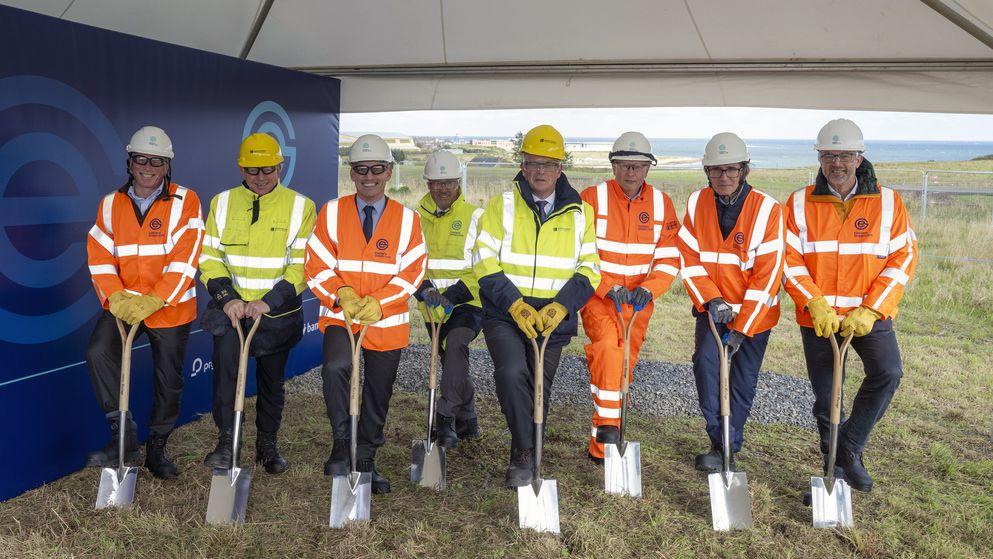
BAM gets underway with UK’s largest electricity project - Eastern Green Link 2
BAM gets underway with UK’s largest electricity project - Eastern Green Link 2
Construction work on the £4.3bn EGL2 project took a major step forward today with a symbolic simultaneous groundbreaking ceremony in Scotland and England at each end of the 2GW subsea electricity link.
At 500km+ in length, the project includes what will be the longest HVDC subsea cable in the UK (436km) and is the UK’s single largest electricity transmission project ever, providing enough green electricity to power around two million homes.
The project will support hundreds of skilled jobs during the construction phase and thousands more across the wider economy, including through supply chain activity.
BAM joined representatives from SSEN Transmission and National Grid Electricity Transmission (NGET), to celebrate this milestone step towards decarbonising national energy infrastructure. The first ceremonial spadefuls of earth were taken, marking the start of main construction, at events held in Peterhead in Aberdeenshire and Drax in North Yorkshire.
BAM, in partnership with Hitachi Energy, will deliver the converter stations at either end of the link that will integrate the HVDC subsea cable into the UK grid, facilitating the delivery of clean energy to around two million homes. This role ensures that Scotland’s renewable energy is transmitted efficiently to where it’s needed most.


Huw Jones, Managing Director of BAM Nuttall, said:
“EGL2 is an important step towards achieving the UK’s Net Zero ambitions and BAM is proud to play a role in delivering the infrastructure needed.
“Once complete, this project alone will contribute around 4% of the entire UK target to Net Zero. It truly embodies BAM’s strategy of 'Building a Sustainable Tomorrow,' showcasing our commitment to delivering infrastructure that matters for the future.”
Commenting at the ceremony, the Chair of SSEN Transmission’s Board, Gregor Alexander, said: “Today’s groundbreaking is a landmark day in this nationally critical infrastructure project, and testament to a huge collective effort from the project teams at SSEN Transmission and NGET who have worked tirelessly to get us to a stage where construction work can begin.
“EGL2 will play a major role in bolstering energy security and contributing to net zero targets, but it will also generate jobs and provide a legacy to local communities here in the north-east of Scotland, where our teams are already supporting local environmental initiatives.
“We are committed to working alongside the local community throughout the lifetime of the project and beyond, as we aim to be a positive force in the communities we operate.”
Chair of the SSEN Transmission Board, Gregor Alexander, was joined in Peterhead by other representatives from SSEN Transmission and NGET, as well as representatives from key supply chain partners on the project Prysmian, who will manufacture and install the cable, and Hitachi Energy and BAM, who together will supply converter stations at either end of the link, as well as representatives from the industry regulator Ofgem too.
The landmark moment follows on from Ofgem confirming its final approval on the costs associated with delivery of project, allowing construction on the 525kV 2GW subsea connection to get started.
Akshay Kaul, Ofgem Director General for Infrastructure Group, said:
“Today is a historic occasion. Not only is construction starting on EGL2, Britain’s biggest ever electricity transmission project, but we’re also standing here two years earlier than we might have been thanks to Ofgem’s fast track new process which cuts red tape to get consumers across the country connected to renewable energy more quickly.
“Harnessing homegrown clean energy will help build a secure energy future for Britain, and projects like EGL2 are pivotal in our move towards that. The part Scotland plays in achieving that goal cannot be overstated, and the long-term gains for Scottish billpayers, in terms of secure, more affordable, and cleaner power will be reaped for generations to come.”
EGL2 is expected to be fully energised and operational in 2029.

